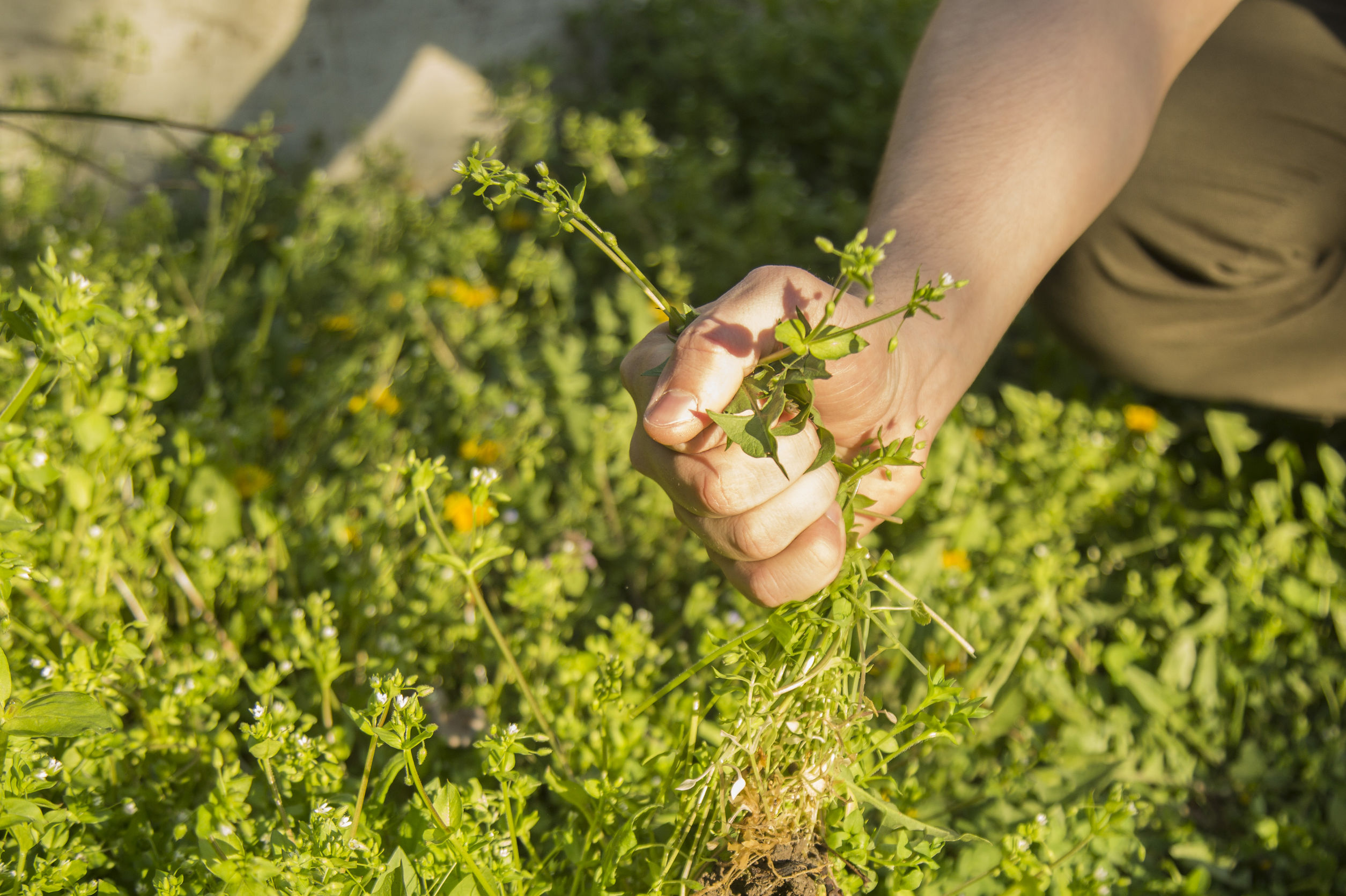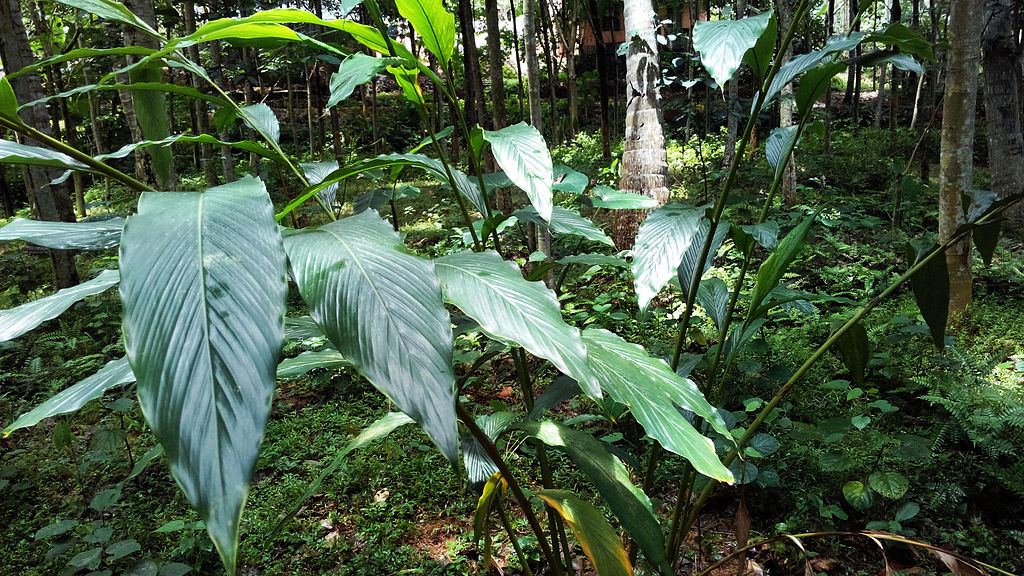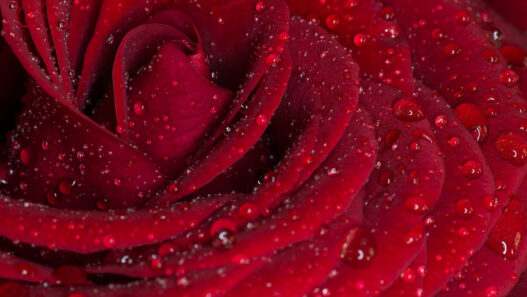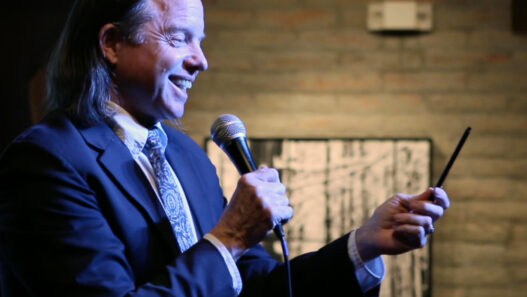Hi, welcome back to the Lam Rim (LAM RIM): Love in the Times of the Virus. We are on episode four.
I called episode four “The Best and the Worst.” You can see an image here of a couple, and they look really happy. They are unreal. They’re too good-looking. They’re both too good-looking. It is like Seiji and his friend. You know this story and I know this story. People ask me, “Geshe-la, I want to give up desire. I want to live a simple life. Should I give up having a boyfriend or a girlfriend, or a wife or a husband? Should I give that up?” I have to say from many, many years of experience that having a good partner, especially a spiritual partner, is the happiest thing you can do in your life, if it’s going well. On those perfect days, it really is like this photograph and it does feel like magic. I know people who had a difficult relationship. Then they gave up relationships for ten years, twenty years, thirty years. I don’t know, it seems very sad to me. I think you can make it work if you understand the seeds, and it can be the most beautiful thing in your life. I think it’s the most beautiful thing in your life.
But you know and I know that when it goes bad, the most beautiful thing in the world changes to the most terrible thing in the world. And there’s nothing like that suffering of staying with somebody in the same house or the same apartment and you used to love each other, and now you really hate this person more than anybody, or they just bother you all the time, and you feel tension all the time. So this episode, number four, we call it the best and the worst because there seems to be that when something can be very beautiful, it can also be very terrible. It just depends on how well you can keep the seeds going, what kind of seeds you can plant. But it does seem to be, in life, that the most beautiful things can turn into the most terrible things. Now why are we talking about that? Let’s go back to the text.
[su_icon icon=”icon: link” color=”#ff1259″ size=”20″ shape_size=”12″ url=”https://youtu.be/B51-ZYEgAmU?t=2m54s” target=”blank”]Video[/su_icon]ma sung na ni (MA BSRUNGS NA NI)—Pabongka Rinpoche was describing how cool it is if one person is nice to other people, especially in hard times, especially in difficult places and difficult times in history, like right now. People who are sweet to each other, people who share things, people who treat each other with respect and love in these difficult times, then they are… it’s like a Buddha came back to this planet. Those people are special. And I have to say, to do small nice things for other people during these dangerous times, is the sweetest… I mean, it’s going to make you happy. It’s like a direct highway to happiness. Of course it’s a terrible thing, of course it’s hurting everyone, but this is the time when you can be a real Buddhist. You can be a Buddha. You can be a really special person now. So these are good opportunities.
Now, what if we give in to that selfishness? What if we have these emotions? I don’t know about you, for me it’s when I can’t sleep. It seems like more people are having trouble sleeping nowadays. Of course! It’s a dangerous time. It’s a time for a lot of worries. We’re worried about ourselves, we’re worried about other people. So, what if we give in to that instinct and we say, “Okay. Oh, there’s ten packs of toilet paper. I’ll buy all of them. Forget the other people.” Or, “My money’s tight right now, so let me call the church or the temple or the mosque, and let me cancel that donation I make every month. I’ll tell them, “this is difficult. I’m having trouble right now. I can’t make that donation.” Forget the Gold Club. I’ll cut the donation to the Gold Club.” So, it’s tempting to think that way. Now, what the text says:
[su_icon icon=”icon: link” color=”#ff1259″ size=”20″ shape_size=”12″ url=”https://youtu.be/B51-ZYEgAmU?t=5m08s” target=”blank”]Video[/su_icon]ma sung na ni, gelong la rabtu chepay do (DGE SLONG LA RAB TU GCES PA’I MDO). There’s a sutra called “I Love Being Nice.” There’s a sutra called “I Love Being Nice”—rabtu chepa (RAB TU GCES PA). Seiji has it in his text: dak chendzin (BDAG GCES ‘DZIN), which is “self-cherishing.” Here we have chepa (GCES PA), meaning I really “love,” and I “value” being good to other people. That sutra says: la lay tsultrim dewa te, la lay tsultrim dukngel yin, (LA LA’I TSUL KHRIMS BDE BA STE, ,LA LA’I TSUL KHRIMS SDUG BSNGAL YIN,) tsultrim denpa dewa te, tsultrim chelwa dukngel lo (,TSUL KHRIMS LDAN PA BDE BA STE, ,TSUL KHRIMS ‘CHAL BA SDUG BSNGAL LO,).
It’s like the girlfriend or it’s like the boyfriend. la lay tsultrim dewa te—some people’s morality makes them happy all day. Some people’s morality makes them suffer all day. tsultrim denpa dewa te—when you keep your morality—when you are nice to other people—that’s pretty much the definition of happiness. And, tsultrim chelwa dukngel lo—when you break down, and in the days of the virus, you get selfish and you hold what you have, and you don’t share and you’re nervous and you’re tense and you treat other people badly, well, then breaking the same morality is the worst thing. So, morality—the vows, the commitments you have to be nice to other people—they are like a boyfriend or girlfriend. They can make you incredibly happy or they can make you terribly sad and miserable. If you break those laws of morality, if you treat other people mean, and tense, and unhappy, then the same vows are going to make you miserable. Got it? Just like that girlfriend or that boyfriend.
And I went and got it for you. I found it: la lay tsultrim dewa te, la lay tsultrim dukngel gyu, (,LA LA’I TSUL KHRIMS BDE BA STE, ,LA LA’I TSUL KHRIMS SDUG BSNGAL RGYU,) tsultrim denpa deway chok, tsultrim chelpa dukngel yin, (,TSUL KHRIMS LDAN PA BDE BA’I MCHOG ,TSUL KHRIMS ‘CHAL PA SDUG BSNGAL YIN,) shintu lekpar tsultrim gang, dampe mi de dzepay suk, (,SHIN TU LEGS PAR TSUL KHRIMS GANG, ,BSDAMS PAS MI DE MDZES PA’I GZUGS,) dulwa la ni nyewar ne, tsultrim lappa rang yi che, (,’DUL BA LA NI NYE BAR GNAS, ,TSUL KHRIMS BSLAB PA RANG YID CHES,).
If you keep those good behaviors—if you treat other people nice—then it makes you beautiful and you can believe in yourself. If you share what you have in the time of the virus, for the rest of your life you can believe in you. You can believe in you. And if you break down now and you give in to selfishness, you will have to think about it for the rest of your life. I can tell you from having lived a long life, the times I was good to other people and I wasn’t selfish, they gave me a lot of pleasure. I can think about them any time. I’m proud of them. rang yi che (RANG YID CHES) means then you can believe in yourself for the rest of your life.
she dang, tsultrim yang dakpar denpay do le (ZHES DANG, TSUL KHRIMS YANG DAG PAR LDAN PA’I MDO LAS) Then there’s another sutra that he quotes, which is the sutra about people who stay nice to other people. There’s a very, very powerful line there, and I remember it. I’ve heard it spoken many, many times. And it is: gelong dak sok dang drel shing shiwa ni la-y, tsultrim nyam shing shikpa ni de ta mayin no (DGE SLONG DAG SROG DANG BRAL ZHING SHI BA NI BLA’I, TSUL KHRIMS NYAMS SHING ZHIG PA NI DE LTA MA YIN NO). I’m going to say it again. gelong dak sok dang drel shing shiwa ni la-y, tsultrim nyam shing shikpa ni de ta mayin no. gelong dak sok dang drel shing shiwa ni la-y, tsultrim nyam shing shikpa ni de ta mayin no. Losing your life is a hard thing, but losing your morality is much, much worse.
[su_icon icon=”icon: link” color=”#ff1259″ size=”20″ shape_size=”12″ url=”https://youtu.be/B51-ZYEgAmU?t=9m36s” target=”blank”]Video[/su_icon]If you compare, breaking down during the time of the virus and becoming selfish is much worse than dying. It’s better you died than that you were selfish during the virus. That’s weird. Right? It’s weird to say that. “Geshe-la, everybody was a little selfish. I just bought a little extra toilet paper. I’m not some kind of monster.” No! Buddha said a little bit of selfish behavior during the virus is worse than dying. And there’s a debate about the spelling here. Those of you who know some Tibetan, la-y (BLA’I)—there’s a word here, la-y, and if you spell it with B-L-A—ba’o latak la (BA’O LA BTAGS LA). If you spell it B-L-A, it means it would be “better” to die than to be selfish during the virus. If you spell it with an S… and the spelling in the scriptures is about fifty-fifty. It’d be interesting to try to find the Sanskrit, because that would decide it. If you spell it with an S—sa latak la (SA LA BTAGS LA; SLA)—it means much, much “easier.” No problem. Dying is much, much easier than being selfish during the time of the virus. Dying would be an easy thing compared to not sharing your money during the virus.

“Whoa! What do you mean?” And we have an image here. I’ve been spending a lot of time gardening because I’m locked down. I used to make Veronica do all the gardening and I used to enjoy the flowers. Now, she’s like, “Okay, you’re here, you’ve got to pull some weeds.” So what you see here is… You know gardening is not planting beautiful flowers. Gardening is sitting there on your knees and pulling weeds hour after hour. It’s a dumb thing. In fact we had a debate. I said, “This is not a weed. I’m not pulling it out.” She said, “It is a weed.” I said, “But it’s a beautiful flower.” She says, “Yeah, it’s a weed with a beautiful flower.” I said, “But, if it has a beautiful flower, it’s not a weed. We should be growing it.” She said, “No, this is a weed.” I said, “Who decided this is a weed?” She said, “I don’t know. Everybody decided this is a weed.” I said, “But I like the flower! The bees also like the flower!” We had a debate like that. Last week I bought some flowers for the fall because we have to plant different flowers for our bees. We have a bee hive. I found a flower… on the package it says in Hawaii this is a weed; in California, this is a garden flower. I showed it to her, “This is the emptiness of weeds.” Why am I talking about that?
When you pull a weed out, you have to be careful not to shake it, because when you shake it a hundred seeds fall out from the seed pod. When you pull a weed out, if you shake it, then it creates a hundred more weeds. See what I mean? Why am I talking about that? Being selfish during the virus—not sharing what you have during the virus—is like a weed and it’s going to create a hundred more or a thousand more selfish events. You see that I mean? It would have been better if you had died, just before you were selfish. Because if you’re a little bit selfish with small things, during difficult days when everyone needs you to not be selfish, then you’re planting more seeds to be selfish in the future. Thousands of seeds. You are shaking a weed. It’s a very interesting thing. It would be better if you died than to be selfish in a small way during the virus because that will create a thousand more selfish events and you will suffer much more than if you had died. Okay?
[su_icon icon=”icon: link” color=”#ff1259″ size=”20″ shape_size=”12″ url=”https://youtu.be/B51-ZYEgAmU?t=13m58s” target=”blank”]Video[/su_icon]You know, it’s not popular to say things like that in America. We’re not supposed to say things like that, but it’s true. It’s true, and I didn’t say it; the Buddha said it. Better to die than to be selfish in a small way during the virus. It doesn’t mean you should go kill yourself. It doesn’t mean that. It means don’t be selfish, be unselfish, and don’t break your vows just because there’s a virus going around. Your vows are supposed to last longer than that. You don’t end here. This is not the end. If you catch the virus and you die—it’s not the end. You will continue. You will live in another place. It’s so funny. People say, “I don’t believe in a future life.” I say, “Were you born?” “Well yeah.” “So, how were you born?” “Oh, causes and conditions, Geshe-la. Cause and effect. Small causes came together, I got born.” So I said, “Can it happen again?” They say, “No.” I say, “In a thousand years could it happen again?” “Well, maybe.” “In a billion years can it happen again?” “I guess probably.” “In a billion, billion years, could it happen again?” “For sure!” “Okay, so you’re going to be born again.” Duh!
de chiy chir she na, sok dang drel shing shiwe ni kyewa di nyi kyi tse separ gyur (DE CI’I PHYIR ZHE NA, SROG DANG BRAL ZHING SHI BAS NI SKYE BA ‘DI NYID KYI TSE ZAD PAR ‘GYUR) Then Pabongka Rinpoche says why is the Buddha being so radical? Why did the Buddha say it’s better to die? He said, “look, sok dang drel shing shiwe ni kyewa di nyi kyi tse separ gyur—when you die, you just lose one life.” When you die in this world, during this virus, if you die, you lose one life. tsultrim nyam shing shikpe ni kyewa bum trak gyay bardu rik dang drel shing dewa pang te (TSUL KHRIMS NYAMS SHING ZHIG PAS NI SKYE BA ‘BUM PHRAG BRGYA’I BAR DU RIGS DANG BRAL ZHING BDE BA SPANGS TE) but if you break down during the pressure of the virus, and you’re selfish and you hurt other people—you don’t share what you have with other people—then you are affecting, he says, one-hundred times one hundred-thousand lives—ten million lives. You are affecting ten million lives. drel shing (BRAL ZHING)—you won’t be happy, you won’t be born into a good place with a good family, and you are basically sacrificing happiness of ten million lifetimes by being selfish during the virus. You might as well die. It would be better if you had died.
pang te nampar tunwa chenpo nyam su nyongwar gyur ro (SPANGS TE RNAM PAR LTUNG BA CHEN PO NYAMS SU MYONG BAR ‘GYUR RO) you will have a terrible life for ten million lifetimes. “Oh, Geshe-la, it’s too much. How can one small selfishness ruin ten million lifetimes?” “Oh, well, how can one cell from your mother, called an egg or an ovum, and one cell from your father, in the sperm, how can they create your body?” I believe the number is one hundred-billion cells. You guys have to check for me. But the number of cells in the human body is about one hundred-billion. “Don’t tell me two things can’t create a hundred billion things, because the tongue you used to tell me that with is already proof that that’s wrong.” It is kind of funny. I went and got this quotation from the “Lam Rim Chenmo” (LAM RIM CHEN MO) by Tsongkapa. It says better to die. The word is “better.” Then I found it in the Kangyur (BKA’ ’GYUR), and it says “easier.” It’s the other spelling. It’s an easier thing to die. So you guys can cook it. Maybe you guys can debate it.
[su_icon icon=”icon: link” color=”#ff1259″ size=”20″ shape_size=”12″ url=”https://youtu.be/B51-ZYEgAmU?t=17m58s” target=”blank”]Video[/su_icon]Then Pabongka Rinpoche quoted “Lung Nam Je” (LUNG RNAM ‘BYED), which is an old Vinaya sutra. I think it’s misspelled here in the name. gangshik tunpa tukjey tenpa la, yanwar sem shing chung se da chepa, (,GANG ZHIG STON PA THUGS RJE’I BSTAN PA LA, ,YANG BAR SEMS SHING CUNG ZAD ‘DA’ BYED PA,) de ni de le dukngel shenwang tob, miktsel sekpe amay tsel nyam shin (,DE NI DE LAS SDUG BSNGAL GZHAN DBANG ‘THOB, ,SMIG TSAL BREGS PAS AA MRA’I TSAL NYAMS BZHIN,) We’re kind of going on to another subject and that’s called… what do you want to call it? “dis-ing the rules.” Like, “Okay, yeah, yeah, I’m supposed to share my toilet paper. Tell me something significant Geshe-la. You know, tell me about a vaccine, tell me about a trillion-dollar bailout, but don’t talk to me about this little stuff. What, I’m supposed to share my toilet paper? Get real, Geshe-la. Talk about something big.”
So the next section of the lam rim is all about understanding that it’s the small things—the Dharma is in the small things. The Dharma is in your small behaviors. It’s not like inventing a vaccine or—that would be nice—or raising a billion dollars for the whole country to get a paycheck. That’s good stuff! But, the amazing life is in the small things. The beauty of life is in the small things. It’s a beautiful thing he says. So don’t blow it off. That’s the word I’m looking for. In American English, we say don’t blow it off. “Don’t say all that. Come on, stop talking about toilet paper. Start talking about stimulus checks for ten billion dollars.” No, the success of your practice is in the small things. Don’t blow off the small things. Many small things make a Buddha.
de ni de le dukngel shenwang tob (,DE NI DE LAS SDUG BSNGAL GZHAN DBANG ‘THOB) So a person who blows off the small things and says, “Oh, this is not so important. This thing is not that important.” That person shenwang tob (GZHAN DBANG ‘THOB). This is a very famous expression in the Mind-Only School, shenwang (GZHAN DBANG). Do you guys remember? Who can tell me? For fifty dollars? shenwang Other… Other power. Under the other power. Here you see it in a normal sentence. So shenwang is the Mind-Only School word for cause and effect really. Because causes have to wait for… sorry, effects have to wait for causes. Causes are fat-cats, effects are their gofers. And effects have to wait on the fat-cats. The result has to wait for the cause. So anyway, shenwang. This person who blows off small details of being nice to other people, they say, “Look, I’m a big Buddhist. I deal with millions of dollars. I don’t hold doors open for people. I’m doing my Buddhism, Geshe-la, on a higher level.” Then you don’t get it. The success of your practice is in the small things and when you blow them off, you are hurting the big things. And he gives an example.
He gives an example, and it’s kind of weird. You have to be in India to understand it. The young mango trees, which are a big part of Indian life… If you live in India, the mango season is a joyous time. It’s a really, really happy time when the mangoes come in. The first mangoes are worth twenty dollars, and then a week later, they are worth five dollars. A week later they are worth fifty cents, and a week later everyone’s trying to give them away. So, anyway, mango trees are very valuable in India, and very delicious and very productive. But, they tend to grow weeds around them. Sometimes people will go out to cut the weeds with a sickle and they will cut the mango tree by accident. So what’s the example for, you guys? Thirty dollar question. He went to cut the weeds and he cut the mango tree. He blew off… He said, “Don’t talk to me about sharing toilet paper. That’s like weeds.” Yeah, but, if you ignore the weeds… if you don’t treat the weeds right, you lose your mango grove. Does it make sense?
[su_icon icon=”icon: link” color=”#ff1259″ size=”20″ shape_size=”12″ url=”https://youtu.be/B51-ZYEgAmU?t=23m11s” target=”blank”]Video[/su_icon]If you don’t mow your lawn right, you give your car a flat tire. How’s that? Think about it. It means, finesse the small things in your Dharma practice, and then you protect the big things. But if you’re sloppy with the small things, you’re going to ruin the big things. How’s that? Famous example. di na la le gyelpoy tsik chen yang, de na len ga chepa tob mingyur (,’DI NA LA LAS RGYAL PO’I TSIG CHEN YANG, ,’DAS NA LAN ‘GA’ CHAD PA ‘THOB MI ‘GYUR,) tubpay ka lung tsul min da che na, du gror drongyur a-lay dab lu shin (,THUB PA’I BKA’ LUNG TSUL MIN ‘DA’ BYAS NA, ,DUD ‘GROR ‘GRO ‘GYUR AE LA’I ‘DAB KLU BZHIN,) So, I live in Arizona, and we are virus stupid people. We don’t like laws, we don’t like to be told what to do, so we are like the worst state in America with the virus. It doesn’t mean don’t come visit me. We will get through it. We have a huge state; it takes six or seven hours to drive to our retreat center, and you don’t leave the state—and we like to drive fast.
This is the only state in America where you don’t have to wear a helmet on a motorcycle. Because we like to go fast and we like danger. It’s stupid during the virus. We get a lot of tickets. We get a lot of speeding tickets. The police love to sit there and catch Arizona people because we always go too fast. Now, ever since I was a kid… when I was a little kid, my mom would go too fast. Four brothers in the car, and my mom is driving too fast, and the police will stop her. She never cried, ever. I never saw her cry. I mean sometimes, at a good movie or something. When the police stopped her, she starts crying, “Oh, oh! I have four kids in the car, I don’t have enough food.” The police are, “Oh, it’s okay. Next time don’t drive so fast. Don’t worry, I won’t give you a penalty.” It’s really funny. And then she rolled up the window and the tears stopped. She said, “Okay kids, let’s go. The cop, he gave us a break.”
So here in the lam rim it says you can get a break from the authorities if you know how to talk, if you know how to cry, sometimes you don’t get punishment for the things you do, but… what’s he going to say? In the world you can talk your way out of it but… you cannot talk your way out of karma. You cannot talk your way out of karma. Karma is not like a policeman, who, if you start crying, the policeman’s going to say, “Oh, it’s okay. It’s okay.” Karma never has an exception. Karma always comes back to you. tubpay ka lung tsul min da che na—if you break even a small rule that the Buddha gave us, then you’re in for a bad time. Probably you will be born as an animal, he says here. Then he says a-lay dab lu shin (AE LA’I ‘DAB KLU BZHIN), and this is a weird thing in Sanskrit, called a-la. And a-la in Sanskrit is a cardamom seed, that very delicious thing they put in Indian tea. I have a picture here of an a-la plant. It’s got very weird leaves. The leaves look very strange. I didn’t number it, you guys; I just threw it in there. Sorry. There you go. Yeah, that is a cardamom plant.
[su_icon icon=”icon: link” color=”#ff1259″ size=”20″ shape_size=”12″ url=”https://youtu.be/B51-ZYEgAmU?t=27m17s” target=”blank”]Video[/su_icon]
It says here, you’re going to end up like that cardamom plant guy. This is a reference to a person. And it’s a beautiful story. So here’s the story. And I think it might have to do the virus, but Buddhist people are supposed to respect the environment, okay. Buddhist people, we are required by Lord Buddha to respect the environment. For example, monks and nuns are not allowed to cut a green plant without a special prayer. It’s a vow—-we’re not allowed to cut a green plant without a special ritual because, Buddha said, you are destroying a city for tiny, tiny creatures. It’s like you bomb a whole city for tiny, tiny creatures. There are tiny, tiny creatures that you cannot see who are living under the leaves, around the plant, and when you cut the plant, or you kill a plant, or you make pollution and you kill a whole Amazon, you are killing billions of people’s homes.
The word “person,” “people,” in Buddhism, doesn’t distinguish between humans and animals. When you destroy the Amazon, you are destroying billions of people’s homes. And you get the karma of destroying billions of people’s homes. In the Vinaya, we’re not even allowed to spit on a plant because we might hurt some of the small creatures who lived there. That’s their city; it might drown some of them. It’s very interesting. Anyway, there was a monk in ancient times, he read this tiny mini vow, mini monks’ vow. It’s called a tung-che (LTUNG BYED). It’s a mini vow, and the mini vow is: don’t spit on green plants and don’t cut green plants without special purpose. He was doing meditation in a cave, and he’s go rek (MGO BREGS)—go rek means “shaved head.” There was an a-la plant growing on top of the cave, at the doorway. And every time he went out, it scratched his bald head. Many times he said, “I’ve got to pull this thing out.” And then he remembered his vow. He said, “No, there are small creatures living there. Maybe there’s a whole city of small creatures. I shouldn’t pull it out.” But, he kept scratching it.
One day he scratched it three times. Then he said, “That’s it. I’m pulling the plant”… he pulled the plant out. That’s bad, but then he said something worse. He said, “These stupid small rules the Buddha piles on us—two hundred fifty-three small rules for monks. It’s too much! What’s he thinking? This is dumb! These monk’s vows are dumb!” He said something like that. Guess what happened to him? He was born as a naga, like a small dragon, and he had—I forget—seven heads or something. They all look like a cardamom plant. He looks like a walking cardamom plant. That’s the story of this guy. I like the next picture. I’ll show you the next picture.
[su_icon icon=”icon: link” color=”#ff1259″ size=”20″ shape_size=”12″ url=”https://youtu.be/B51-ZYEgAmU?t=31m02s” target=”blank”]Video[/su_icon]If you talk about how does Buddhism speak about the environment, protecting the environment, in the next picture here, you can see someone is drinking water from a stream. So, in the old days, two and a half thousand years ago, when the monks needed water, they just went to a stream and they drank. But they’re required by monks vows to check the water first to see if there are any small creatures on the top of the water.

We’re even supposed to use a sieve. Monks are supposed to carry a sieve at all times. They give you one nowadays, they give you a kitchen sieve—it’s about this big—when you become a monk. It’s funny because then you just keep it in your room for the rest of your life. But in the old days, you were supposed to have a little cloth sieve that you keep in your belt all the time. And when you go to a stream to drink, first you sieve the water, and make sure that nothing gets killed by you by accident. No tiny bugs get killed by you by accident. And there’s even an interesting rule in the monks vows that if a group of monks goes down to the stream to drink, the guy to check with his sieve should be the nicest one. The rule is, if there’s five monks, they should pick the most compassionate monk to check the water. So if a monk is not allowed to even take a sip of water from a small stream without protecting the creatures that live there, then what’s going to happen to a whole planet of people who destroyed the rivers of the whole world for billions of creatures? What’s going happen to those people? That’s the level that we’re supposed to take care of our environment, okay?
I’m going keep going. I’m a little bit over, but… I’m sorry. It’s hard for me to guess how long it’s going to take. I’m going to finish this one. jikten dir wang chewa gyelpo chenpoy ka lende na (‘JIG RTEN ‘DIR DBANG CHE BA RGYAL PO CHEN PO’I BKA’ LAS ‘DAS NA,) du gashik gi tse chepa jung la, ga shik la minjungway kab yu mu (DUS ‘GA’ ZHIG GI TSE CHAD PA ‘BYUNG LA, ‘GA’ ZHIG LA MI ‘BYUNG BA’I SKABS YOD MOD,) It’s possible—if you’re living in a country with a very cruel king—that sometimes they will kill you for little things and sometimes they’ll let you go for big things. It just depends on the king’s mood. tunpa tukje chen gyi che tsam le de na, gangshik gang gi tsende na-ang kun la chepa nyong te (STON PA THUGS RJE CAN GYI BCAS MTSAMS LAS ‘DAS NA, GANG ZHIG GANG GI TSE ‘DAS NA’ANG KUN LA CHAD PA MYONG STE,) but if you break even a small rule set by the Buddha, for example, about destroying the homes of small creatures in streams or on leaves, lu a-lay dapmay jungwa tar yin tsul (KLU AE LA’I ‘DAB MA’I BYUNG BA LTAR YIN TSUL,) the same thing will happen to you that happened to Mr. Cardamom Head. He’s called Mr. Cardamom Head. Mr. Cardamom Head dragon. You will become like that.
lu a-lay dap kyang tung-che tsam kye du sepe (KLU AE LA’I ‘DAB KYANG LTUNG BYED TZAM KHYAD DU BSAD PAS) in his previous life, that animal with the strange heads, pulled the plant out that scratched his head and he said, “This is stupid rule.” kye na rang re pam hlak bumpo sok mangpo kye du supa di tar na, chimay drowa ji tar gyur (SKYES NA, RANG RES PHAM LHAG SBOM PO SOGS MANG PO KHYAD DU GSOD PA ‘DI LTAR NA, PHYI MA’I ‘GRO BA JI LTAR ‘GYUR,) Then he says, “Look, Mr. Cardamom Head became an animal by pulling out a few leaves of a cardamom plant that scratched his head. You and me, we do much worse things many times a day. We are not talking you destroyed a few leaves of a plant. We’re talking you destroyed a planet of jungle and trees. You destroyed your whole country’s ecosystem.” So he says ji tar gyur (JI LTAR ‘GYUR) “You think about it.” It’s funny, the lama’s like, “you think about it!” You decide what’s going to happen to you. He stopped like that; he didn’t go further with that.
All right, we finished that episode. It means be good to your planet. Don’t say, “This is a hard economy, we can use coal, we can burn coal for a while. We just had a virus and we need to get the economy going. It’s okay to forget the environment for a while.” And that’s also really dumb. When the economy is bad, if you want to make the economy better, then be nice to nature and be nice to this beautiful blue sky, green plant world, because that will make your economy better.
All right. See you at the next episode.
Thank you, Tim. Thank you, Seiji.










